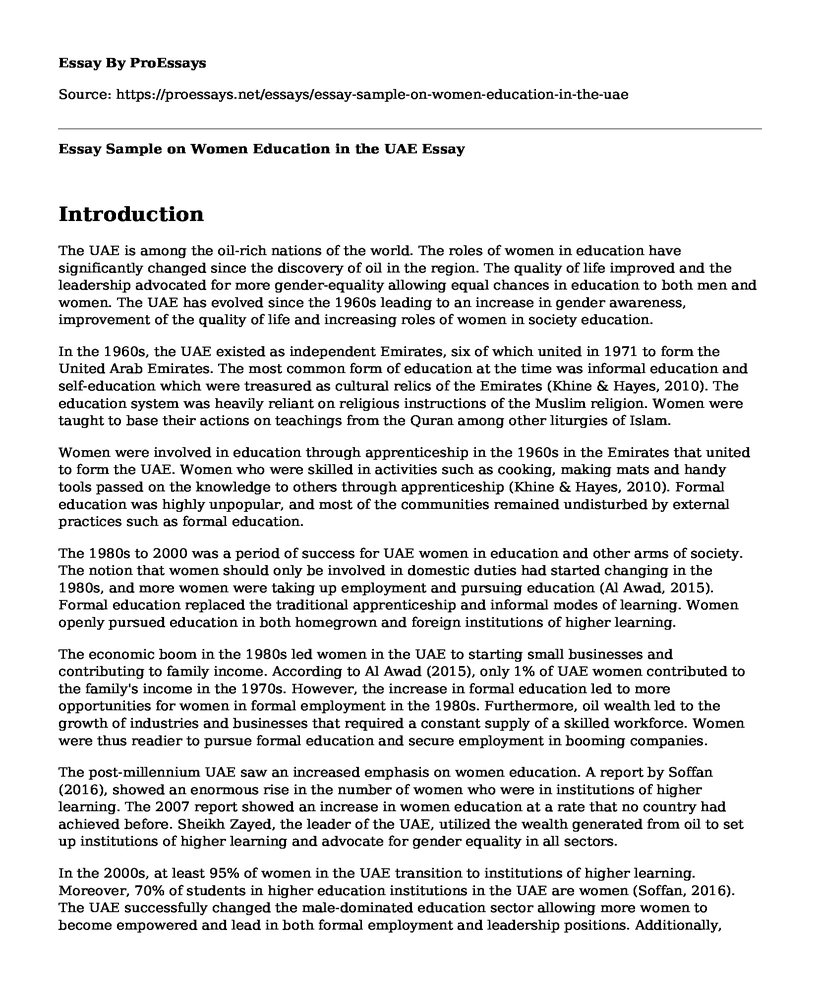Introduction
The UAE is among the oil-rich nations of the world. The roles of women in education have significantly changed since the discovery of oil in the region. The quality of life improved and the leadership advocated for more gender-equality allowing equal chances in education to both men and women. The UAE has evolved since the 1960s leading to an increase in gender awareness, improvement of the quality of life and increasing roles of women in society education.
In the 1960s, the UAE existed as independent Emirates, six of which united in 1971 to form the United Arab Emirates. The most common form of education at the time was informal education and self-education which were treasured as cultural relics of the Emirates (Khine & Hayes, 2010). The education system was heavily reliant on religious instructions of the Muslim religion. Women were taught to base their actions on teachings from the Quran among other liturgies of Islam.
Women were involved in education through apprenticeship in the 1960s in the Emirates that united to form the UAE. Women who were skilled in activities such as cooking, making mats and handy tools passed on the knowledge to others through apprenticeship (Khine & Hayes, 2010). Formal education was highly unpopular, and most of the communities remained undisturbed by external practices such as formal education.
The 1980s to 2000 was a period of success for UAE women in education and other arms of society. The notion that women should only be involved in domestic duties had started changing in the 1980s, and more women were taking up employment and pursuing education (Al Awad, 2015). Formal education replaced the traditional apprenticeship and informal modes of learning. Women openly pursued education in both homegrown and foreign institutions of higher learning.
The economic boom in the 1980s led women in the UAE to starting small businesses and contributing to family income. According to Al Awad (2015), only 1% of UAE women contributed to the family's income in the 1970s. However, the increase in formal education led to more opportunities for women in formal employment in the 1980s. Furthermore, oil wealth led to the growth of industries and businesses that required a constant supply of a skilled workforce. Women were thus readier to pursue formal education and secure employment in booming companies.
The post-millennium UAE saw an increased emphasis on women education. A report by Soffan (2016), showed an enormous rise in the number of women who were in institutions of higher learning. The 2007 report showed an increase in women education at a rate that no country had achieved before. Sheikh Zayed, the leader of the UAE, utilized the wealth generated from oil to set up institutions of higher learning and advocate for gender equality in all sectors.
In the 2000s, at least 95% of women in the UAE transition to institutions of higher learning. Moreover, 70% of students in higher education institutions in the UAE are women (Soffan, 2016). The UAE successfully changed the male-dominated education sector allowing more women to become empowered and lead in both formal employment and leadership positions. Additionally, 50-60% of the female graduates in the UAE are successfully integrated into the job market.
The UAE has experienced tremendous shifts in the role of women in education since the 1960s. Women were predominantly domestic caregivers with no provision for formal education or employment. Through changing strategies and adaptation to trends in modernization, Emirati women rose to become leaders in both institutions of higher learning and the job market. The success of changing education roles in the UAE can be attributed to the just leadership by Sheikh Zayed who believes in social empowerment through education for all. Other countries should emulate the UAE in enhancing education for all people to fuel success across all fronts.
References
Al Awad, M. (2015). Altamkyn al'yqtysady wa tashghyl 'almar'a fy dawlat Al'ymarat Alarabya `Almutahyda (Economic empowerment and female employment in the United Arab Emirates). Institute of Social and Economic Research - Zayed University.
Khine, M. S., & Hayes, B. (2010). Investigating women's ways of knowing: An exploratory study in the UAE. Issues in Educational Research, 20(2), 105-117.
Soffan, L. U. (2016). The Women of the United Arab Emirates. Routledge.
Cite this page
Essay Sample on Women Education in the UAE. (2022, Nov 15). Retrieved from https://proessays.net/essays/essay-sample-on-women-education-in-the-uae
If you are the original author of this essay and no longer wish to have it published on the ProEssays website, please click below to request its removal:
- The Rise of the Reparations Movement - Paper Example
- Essay Sample on Making a Choice: Staying in College Housing or Living Off Campus in Los Angeles
- Essay Example on Season of Migration to the North: Reflection of Modernism in Africa
- French Colonialism & Nigerian Independence Movements - Essay Sample
- Essay Sample on Hiram Park Bell: An Iconic American Life
- Paper Example on Setting Up Literacy Stations: Benefits & Guidelines
- Changing the School Climate - Essay Sample







